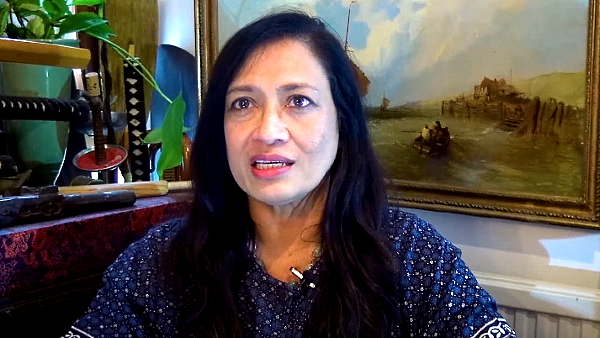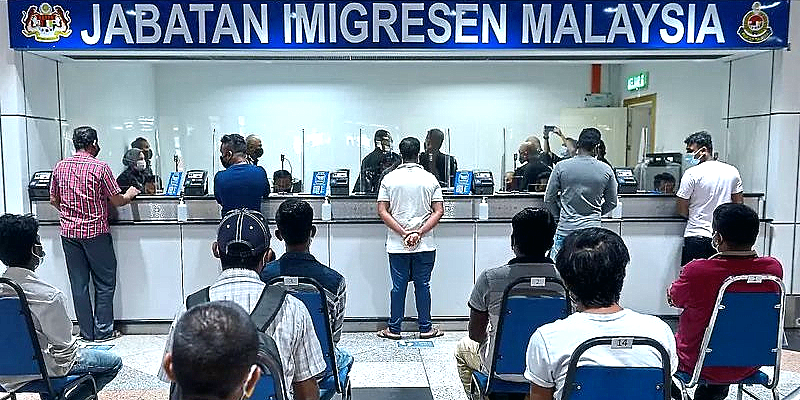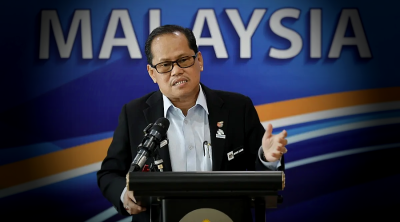
An immigration officer in Johor scolded a woman and her daughter for their inability to converse fluently in Bahasa Malaysia, when he directed questions at them in Malay, following their request to renew their passports.
He had apparently questioned them in Malay, and they had replied in English. They were not too familiar with the Malay language having spent most of their lives in Singapore where Malay is not commonly spoken.
Their admission about living in Singapore was something they freely volunteered, but did the mother and daughter deserve a public humiliation in front of strangers in what is most probably a packed immigration department?
If the immigration officer was overworked, then he was wrong to offload his frustrations and anger on members of the public.
Even if he was incensed that the pair were not proficient in Malay, that still does not give him the liberty to scold both women in public.
He was rude to a teenager. What lessons must she be learning form him as he has set a most horrible example.
The officer is right to say that we must speak and understand our national language, but whose fault is that if both mother and daughter are not proficient in Malay? This is a reflection of the social scene in the Malaysian community.
Politicians and their toxic politics have divided our society and resulted in less interaction of the different races in Malaysia.
If one’s mother tongue is not Malay, then when non-Malays mix, they would most probably speak in their mother tongue and not Bahasa Malaysia.
The politicians should realise that the reduced interaction between the Malays and non-Malays is their fault.
More importantly, the inability for the duo to be fluent in Malay is also a reflection of the quality of our education.
A boring and incompetent teacher will make the subject he is teaching difficult to understand.
On the other hand, a teacher who is able to bring the study of languages to life in the classroom will make the subject more interesting and enjoyable for the pupil.
Learning will become less of a chore and the pupil will be more exposed to the language and as a result, increase his confidence and vocabulary in the language.
In our schools, many teachers are boring and probably do not have the necessary support and teaching resources to fall back on.
Among the requirements for renewing one’s passport are valid documents like the latest identity card and a photocopy of IC, but nowhere does it state that one has to be proficient in the national language, Bahasa Malaysia.
We hear about rude customers and even rude customer service employees in some shops, but how about rude civil servants?
Most of us who frequent government departments know only too well the attitude, mindset and belligerence of these Little Napoleons.
Members of the public who frequent government departments sometimes have to exercise extreme restraint and patience against these aggressive government servants. We remain at their mercy because we fear reprisals.
The Little Napoleons often use delay tactics, or they may place our files at the bottom of the pile, or even “accidentally misplace” our applications altogether.
The woman and her daughter did not deserve a public scolding and humiliation for their poor language skills.
Even government servants need to show respect and professionalism. What happened to customer service?
When Home Minister Saifuddin Nasution Ismail was asked by a reporter to comment on the Johor immigration incident, he was quick to defend the immigration officer and department.
He said that the applicant and her daughter’s poor Malay skills had probably sowed the seed of suspicion that they may not have been legitimate citizens of this country.
He said, “If you can’t (understand the national language), it can lead to suspicion, for example: are you really a citizen since you can’t even speak the language?”
Since when was proficiency and fluency in Malay a requirement for renewing one’s passport? Was Saifuddin making up the rules as he went along?
Thousands of illegal migrants from Bangladesh and Myanmar are fluent in Malay, and some have managed to obtain fake passports to remain in Malaysia. Many speak better Malay than most native Malays, but they are not Malaysian citizens.
Similarly, a Malaysian citizen who has lived abroad most of his life may be rusty in Malay, but that does not mean his citizenship could be revoked.
Incredibly, Saifuddin failed to address the real elephant in the room which is the bad manners, arrogance, and lack of civility of the immigration officer.
There are signs in most, if not all government departments requesting the public to be courteous to civil servants and that rudeness will not be tolerated. Are civil servants not aware it also applies to them?
Would both men have behaved differently if the customer was an elite of VIP member of society or a wealthy celebrity or tourist?
Is it so hard for both men to acknowledge that good manners and professionalism are crucial in our working and personal lives?
Sources:
- Malaysiakini: M’sians must know BM: home minister on Immigration Dept incident
- Malaysiakini: Fact-check: Knowing BM isn’t condition to renew passport

(Mariam Mokhtar is a Freelance Writer.)
ADVERTISEMENT
ADVERTISEMENT








































